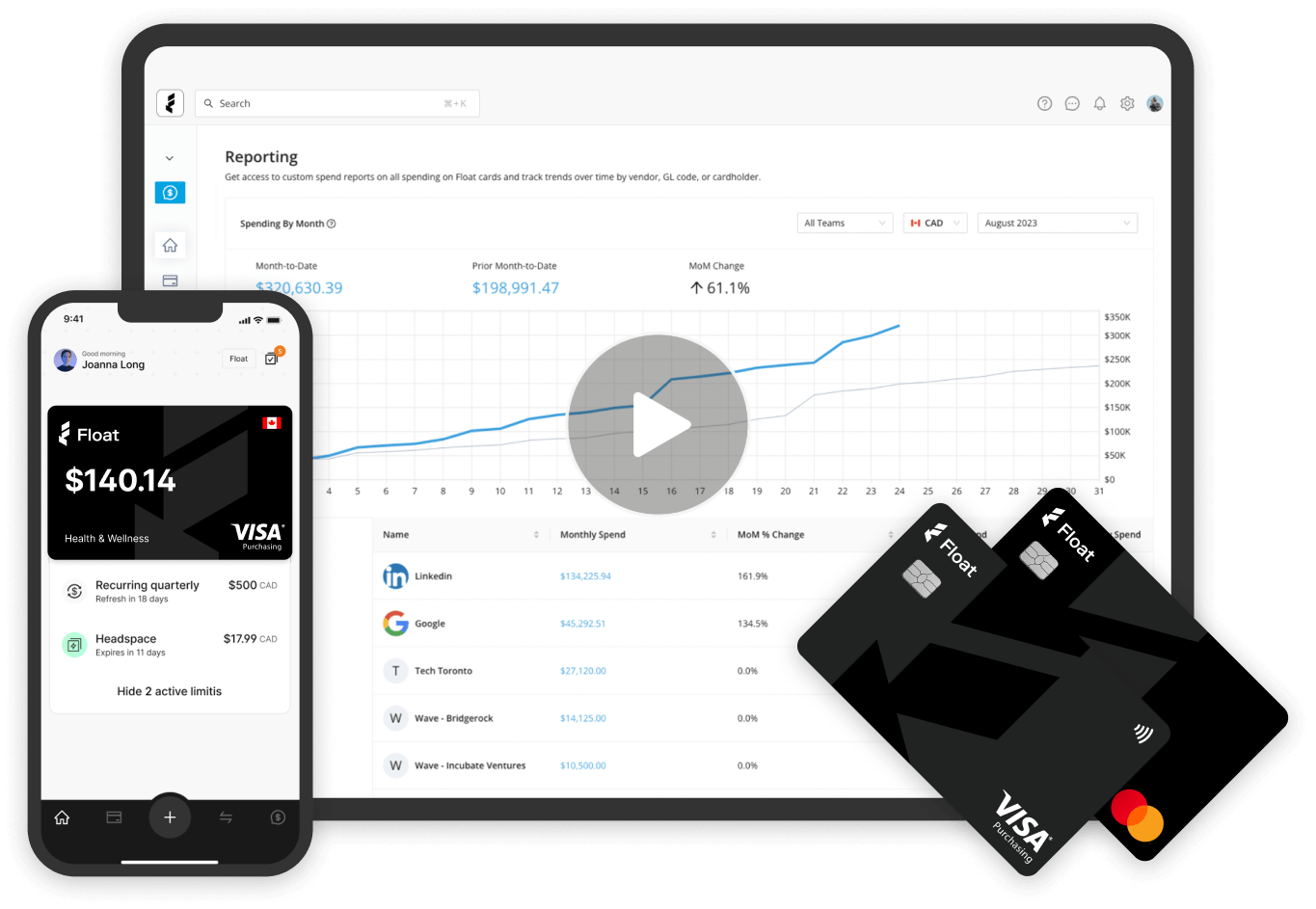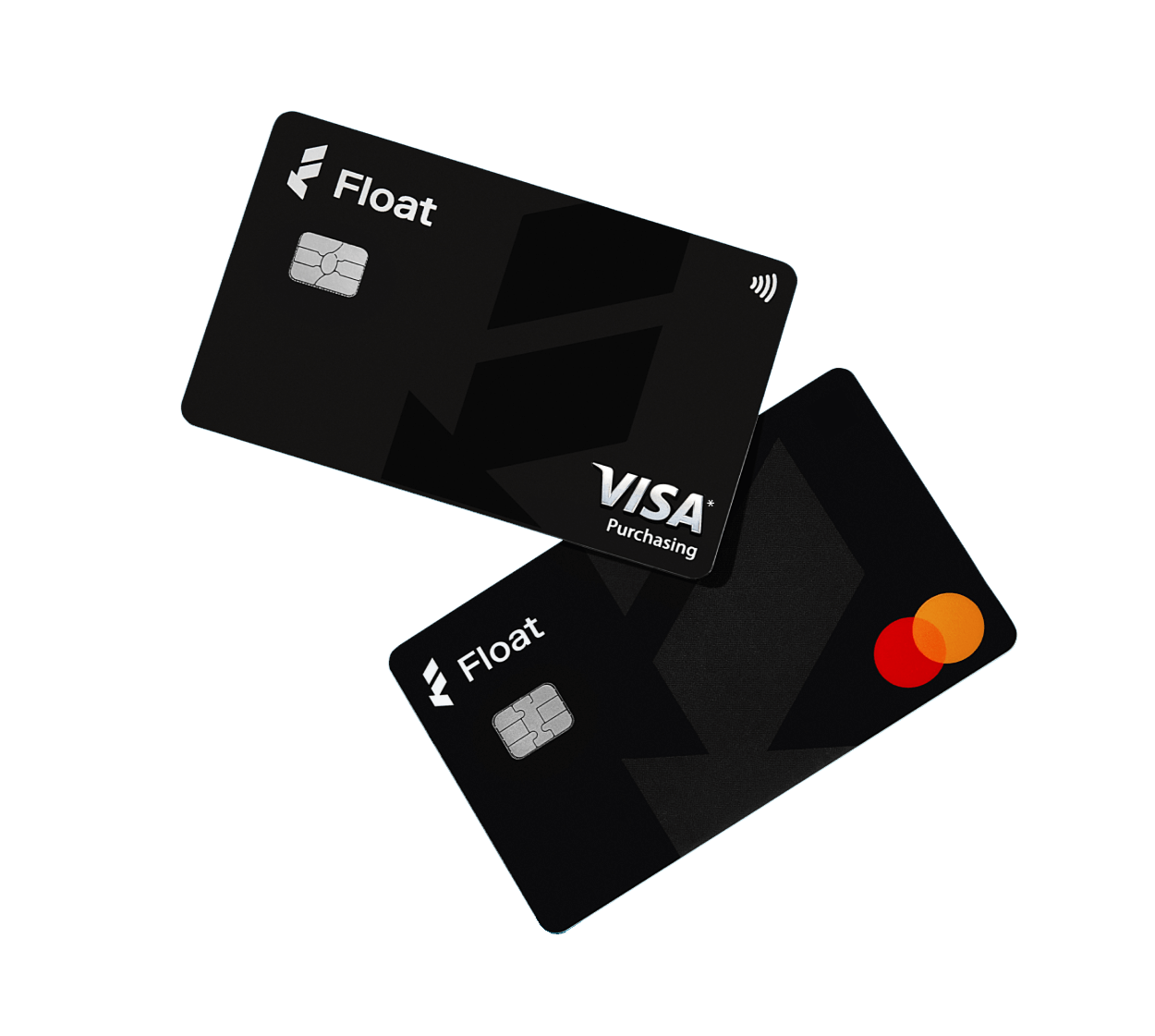Corporate Cards
7 Best Business Credit Cards Canada 2026
Pinpoint the right credit card choice for your company in a sea of options with our roundup of the seven best business credit cards in Canada.
August 20, 2025
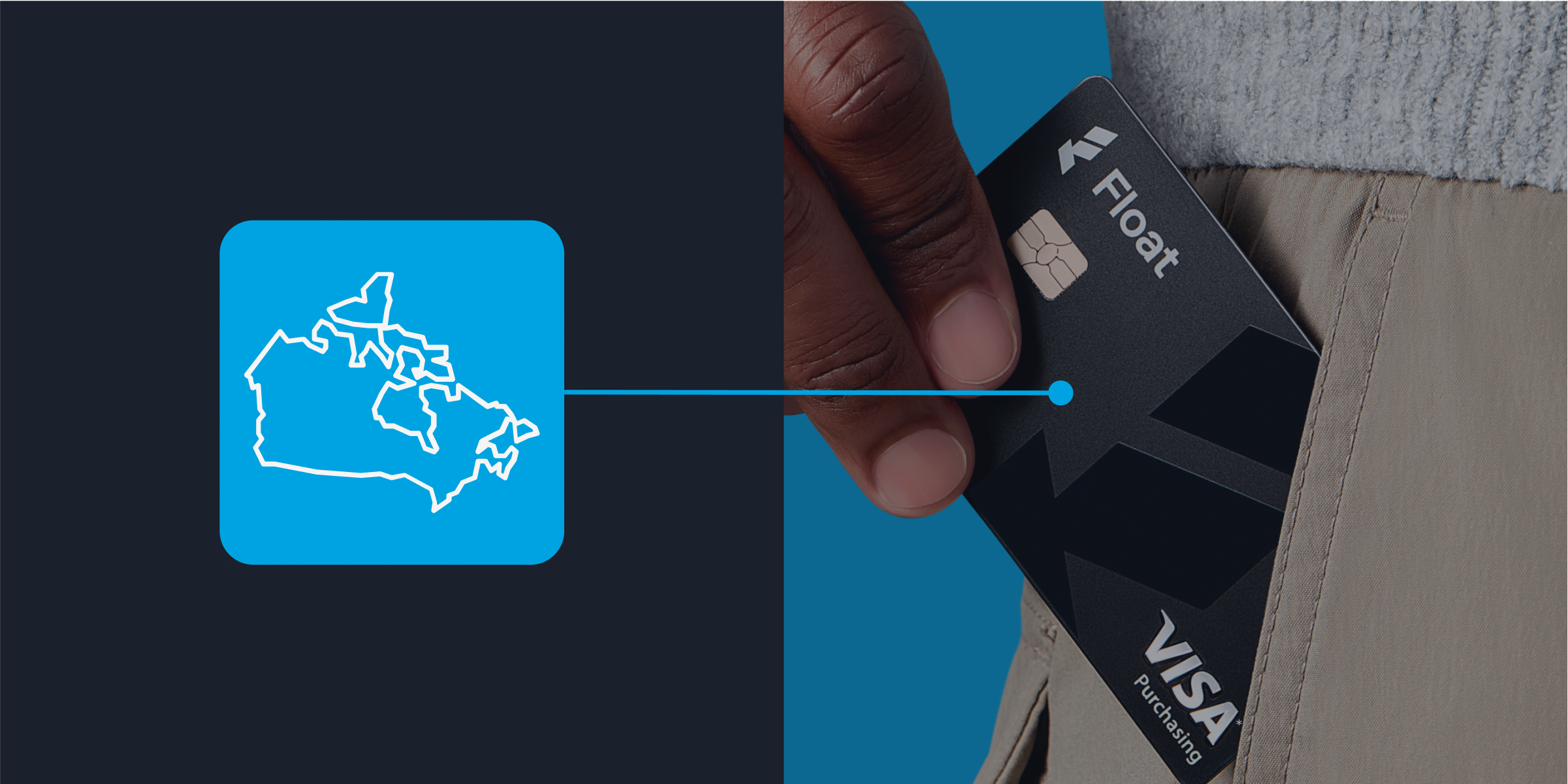
Running a Canadian business means more than just keeping the lights on—it’s about scaling smarter, spending strategically and maximizing every dollar. Whether you’re a startup founder, a finance lead at a growing company or managing expenses for a larger organization, choosing the right business credit card can have a major impact on your bottom line.
This is especially key given how credit is such a critical topic for businesses. Nearly 30% of independent Canadian businesses surveyed still carry pandemic-related debt, with an average balance of $65,000. Although credit card fees have decreased, only 7% of eligible businesses have realized savings.
But here’s the catch: not all business credit cards are built for how you do business. That’s where this guide comes in. We’ll help you find the one that pulls its weight.
Try Float for free
Business finance tools and software made
by Canadians, for Canadian Businesses.
What is a business credit card?
A business credit card is exactly what it sounds like—a credit card built for business spending. Whether you’re a sole proprietor or running an incorporated company, a business card helps keep your work expenses separate from your personal ones (because no one wants to sort through a messy statement at tax time).
But it’s not just about staying organized. Business credit cards often come with perks tailored to how companies spend. They can also help you smooth out cash flow, cover short-term expenses and build your business credit profile, which comes in handy when it’s time to scale up.
Why are business credit cards important?
Running a small business in Canada means wearing a lot of hats—and tracking expenses is one you can’t afford to drop. Here’s why it’s important and how to do it right.
Why expense management matters
From tax time to audit season, strong expense management helps you stay compliant, save money and make smarter decisions.
- Keeps you compliant with CRA regulations
- Enables you to claim tax rebates and benefits
- Prepares you for potential audits
- Provides clear insights into your business finances
Key responsibilities of small business owners
These key responsibilities aren’t just best practices; they’re must-dos if you want to stay onside with the CRA and unlock financial benefits.
Accurate tracking
You’re responsible for recording all business expenses and reporting them correctly to the CRA.
Tax rebate opportunities
Proper expense tracking allows you to apply for GST, HST and other tax rebates in Canada, potentially saving your company significant money.
Audit readiness
Good record-keeping ensures you can pass an audit if one comes your way, reducing stress and potential penalties.
Can I use a personal credit card for business expenses instead of a business credit card?
The debate between using a personal credit card or business credit card is common. After all, as a small business in Canada, using a personal credit card can feel like the easiest option for you as you grow your business.
But it’s not always the cleanest. When you have a dedicated business card, you benefit from:
- Separate personal and company finances
- Building business credit
- Capitalizing on higher spending limit offers
- Company-specific rewards and perks
- A cleaner and more straightforward tax season
Sounds good, right? Now, let’s check out the different kinds of business credit cards available for small businesses in Canada.
Types of small business credit cards in Canada
There are two main types of small business credit cards in Canada: cards from traditional banks and cards from modern fintech providers.
Traditional banks offer corporate cards with familiar perks. However, banks often design these cards with larger, established companies in mind, which means higher fees, more paperwork and slower approval processes. In some cases, we’re talking about weeks to open a credit card—if you get approved at all.
On the other hand, fintech providers are bringing business credit cards into the modern age. With fast approvals, virtual cards, real-time expense tracking and integrations that actually talk to your accounting software, they’re built for businesses that want more control and less hassle. For example, you can open an account with Float and get started with a corporate card in close to 24 hours.
💡Pro tip: This is also a good time to learn about the different types of credit and charge cards that small businesses can leverage.
Learn more about Float
Get a 10-minute guided tour through our platform.
5 best practices for business credit card use in Canada
Whether you’re just starting out or scaling up, a few smart habits can help you avoid unnecessary costs, build credit, and make the most of your spending.
Here are 5 best practices to keep your business finances on track:
1. Keep business and personal spending separate
Mixing expenses can get messy, especially at tax time. Use your business card strictly for business to stay organized and protect yourself legally if you’re incorporated.
2. Pay off your balance every month
Interest charges can quickly eat into your cash flow. Paying in full helps you avoid fees and can boost your business credit score over time.
3. Don’t spend right up to your limit
High credit usage can hurt your credit score. Keep it under control by tracking your spending or making early payments mid-month.
4. Pick a card that pays you back
Look for a card with low fees and rewards that match your business’s spending, whether on travel, office supplies, or digital tools.
5. Avoid cash advances
They’re pricey. If a vendor doesn’t take cards, consider other financing options instead of pulling cash from your line of credit.
What makes a business credit card the “best” for Canadian companies?
The best business cards for Canadian companies are more than just tools for making purchases. They’re financial enablers. Whether you’re scaling a tech startup in Toronto or managing supplier payments for your small business in Calgary, the right card should adapt to your unique needs, not the other way around.
Key features to look for
These features help Canadian businesses improve cash flow, simplify expense management and reduce administrative burden. Instead of chasing receipts or worrying about employee misuse, you can focus on growth and strategy.
- High or flexible credit limits: Support larger purchases and give your business room to grow.
- Low or no annual fees: Keep operating costs predictable and save that cash for more business-critical expenses.
- Reward structures that match your spending: Earn cashback or points on the categories you use most, like office supplies, advertising or travel.
- Seamless integration with accounting tools: Save hours of reconciliation and reduce errors.
- Built-in spend controls and reporting: Empower employees while maintaining oversight.
- Fast approvals with low paperwork: Get access when you need it, not weeks later.
- Strong customer support: Quick help if something goes wrong. Bonus points if they’re based in Canada—you can know you’ll get the exact support you’ll need, tailored to Canadian businesses.
Traditional credit cards vs. a modern expense management solution: which provides the best business credit cards?
Many business owners default to big bank credit cards, often because they seem like the only option. They’re also familiar. Getting a credit card for your business and personal spending from the same bank should make the most sense, right?
But most traditional business credit cards weren’t built for modern, fast-moving teams. They often come with:
- Personal guarantees that put your credit at risk
- Lengthy application processes
- Low starting limits
- High interest rates (often 19-25%)
- Little or poor integration with the tools your team already uses.
That’s why Canadian businesses are now exploring alternatives, like corporate payment cards with built-in controls, instant approvals and no personal liability.
Our criteria for the best business credit card
To help you choose the right option, we compared each card based on:
- Application speed and requirements
- Fee structure and value
- Rewards earning potential
- Credit limits and flexibility
- Canadian business suitability
- User experience and technology
- Customer support quality
We’ve also considered how traditional business credit cards stack up against modern alternatives like Float.
💡Pro tip: Travel a lot for business? Check out our list of the best business credit cards for travel, specifically for Canadian companies.
Best business credit cards in Canada: detailed reviews
Here are our top picks for 2026, with detailed pros, cons and use cases for each.
- Float Corporate Card – Best all-around pick for spend control, scale, and cashback
- American Express Corporate Platinum Card – Best for executive travel and perks
- BMO Cashback Business Mastercard – Best no-fee traditional bank credit card
- RBC Avion Visa Infinite Business – Best for travel rewards
- TD Business Travel Visa Card – Best for Expedia bookings
- CIBC Aventura Visa for Business – Best for flexible rewards
- Scotiabank Passport Visa Infinite Business – Best for no foreign transaction fees
Float Corporate Card – Best all-around pick for spend control, scale, and cashback
Pros:
- No annual fees or personal guarantees
- Cards issued in CAD and USD with high limits—up to $1 M+/up to $3 M depending on funding model
- No foreign transaction fees for USD/CAD spends, only a 0.25% FX rate applied
- 1% cashback on business spending (monthly spend above $25K); earn up to 4% interest on balances
- Integrated expense management, receipt capture and bill pay powered by smart automation
Cons:
- Not a traditional credit card
- Prepaid funding model may require operational adjustments
Rewards structure:
- 1% cashback on all spend
- Up to 4% interest paid on deposits
Fee analysis:
- Float’s Essentials plan is free. No card fees and up to 20 physical and unlimited virtual cards.
- Professional plans (~$100/user/month) unlock unlimited cards and advanced features.
- Cashback blends with a 4% high-yield business savings model, and foreign FX fees are minimized.
Application requirements:
- Quick 5‑minute application process
- Most companies are approved within one business day
- No personal credit checks or personal liability requests
Best for: Scaling teams who want more control, faster onboarding and built-in software that eliminates expense report chaos.
User experience insights: Float receives consistent praise for its intuitive platform and modern tools. Reddit users highlighted the zero foreign exchange fees along with online receipt capture and virtual cards. Float’s real-time visibility into transactions, customizable spend limits, auto receipt capture and instant issue virtual cards are flagged as standout features, especially compared to traditional bank offerings.
Real‑world use case: A Canadian digital marketing agency adopted Float to eliminate reliance on personal credit cards and reimbursements. Receipts upload instantly from employees’ mobile apps; finance staff reconcile expenses in QuickBooks automatically, saving over 8 hours/month in admin work. With USD ad spend and platform fees, the agency saved about 2.5% on FX costs annually. The company’s average $30,000 monthly spend earned cashback and interest simultaneously, helping smooth cash flow and offset recurring operational costs. Float’s centralized approval flows and real-time alerts noticeably improved budget compliance and policy enforcement.
Learn more about Float
Get a 10-minute guided tour through our platform.
American Express Corporate Platinum Card – Best for executive travel and perks
Pros:
- Premium travel and lifestyle benefits
- Extensive airport lounge access
- Comprehensive travel and purchase protection
- Flexible Membership Rewards program
Cons:
- High annual fee
- Overkill for smaller teams or companies with low travel spend
- Not accepted everywhere, especially with smaller vendors
Rewards structure:
- 1.25 membership rewards points per $1 on all purchases
- Points can be redeemed for travel, gift cards, statement credits and more
Fee analysis:
- With $499 in annual fees, but $0 for additional cards, this card can be a good option for bigger firms that have high travel needs.
Application requirements:
- Corporate structure with qualifying revenue and credit profile (minimum credit score of 725)
- Employee card management program
- Creditworthiness and volume of spend assessed by Amex
Best for: Large Canadian businesses and executive teams that prioritize luxury travel, convenience and premium service.
User experience insights: Cardholders were enthusiastic about the benefits and perks of using the card, particularly the travel points and airport lounge access, plus advantages such as priority lanes for events and more. Users have noted that customer service levels are good.
Read more: Float vs. Amex
Real-world use case: A professional services firm headquartered in Toronto issues the Corporate Platinum Card to its C-suite travel teams, including partners and senior managers whose roles require frequent trans‑Canada and international travel. These individuals benefit from airport lounge access, travel insurance coverage and concierge support, making logistics simpler and safer.
Read more: Discover why Coinberry left Amex for Float
BMO Cashback Business Mastercard – Best no-fee traditional bank credit card
Pros:
- No annual fee
- Competitive cashback: 1.5% on gas, office supplies and cell phone/internet bills; 1.75% at Shell gas stations; 0.75% on other purchases
- Extended warranty and purchase insurance coverage
Cons:
- Lower cashback (0.75%) on miscellaneous spend
- Monthly caps on bonus categories limit rewards potential
- Minimal travel perks or premium benefits
Rewards structure:
- 1.5% cashback on gas, office supplies, and cell phone/internet bills for most purchases
- 1.75% cashback at Shell gas stations
- 0.75% cashback across all other expenses
Fee analysis:
- $0 annual fee and no charge for up to 22 employee cards make this a low-risk card for small businesses.
Application requirements:
- Available to Canadian businesses with reasonable credit and proof of activity
- Typical business card qualification applies
- Recommended credit score 660+
Best for: Small businesses and solo entrepreneurs in Canada who want straightforward rewards without annual fees or complicated tracking.
User experience insights: Users appreciate the $0 annual fee and the simplicity of the cashback rewards program, noting that they do not need the travel rewards of competitor business credit cards. Cardholders also appreciate that cashback deposits can be automatically transferred to BMO chequing, savings or InvestorLine accounts. Rewards can be redeemed with as little as $1 earned.
Real‑world use case: A small Vancouver-based graphic design studio operating with a lean team of three uses this card for everyday purchases: fuel for client site visits, office supplies and recurring cell phone and internet bills. With low overhead, they appreciate that each employee can carry a card without additional fees. Over time, they redeem cashback monthly directly into their BMO business account, helping to offset operational costs.
Read more: Float vs. BMO
RBC Avion Visa Infinite Business – Best for travel rewards
Pros:
- Flat 1.25 Avion points per $1 on all eligible purchases (up to $75,000/year)
- Flexible redemption: transfer to airline partners or use RBC’s Air Travel Schedule with fixed pricing
- Strong travel insurance package: emergency medical, trip cancellation/interruption, delayed baggage, mobile device insurance and more
Cons:
- $175 annual fee; additional cards cost $75 each
- 2.5% foreign transaction fee on purchases outside CAD
- Earnings beyond $75,000 drop to 1 point/$1 annually
Rewards structure:
- 1.25 Avion points per $1 spent
- Bonus offers for new users
Fee analysis:
- With a $175 annual fee, you’ll need consistent spend to offset costs. But given the welcome bonus (typically 35,000 Avion points, ~CAD $700–$1,100 in value), and flexible redemptions, the perks are strong for travelling businesses.
Application requirements:
- Canadian business owner with good to excellent credit
- RBC often requests proof of revenue or creditworthiness
- Minimum personal income usually starts around $60,000 or business revenue approx $500K/year
Best for: Businesses with frequent travel needs looking to earn and redeem points on flights and hotels.
User experience insights: Cardholders mention consistently strong welcome bonuses for new users, flexible and straightforward points redemption and strong travel and retail insurance. However, they point out that cashback rates could be improved and that foreign transaction fees are high.
Real‑world use case: A Calgary-based consultant travels across Canada once a month and occasionally abroad. With $10,000/month in business spend (about $6,000 on regular purchases and about $4,000 on travel), she earned 35,000 points as a welcome bonus plus around 11,000 Avion points within two months. Using the Air Travel Redemption Schedule and occasional partner transfers, she booked discounted flights and saved on insurance-related claims.
Read more: Float vs. RBC
TD Business Travel Visa Card – Best for Expedia bookings
Pros:
- Earn 9 TD Rewards Points per $1 on travel booked via Expedia for TD online; 6 points per $1 spent on foreign currency purchases.
- Solid earn rates of 6 points per $1 on dining, public transit, EV charging and streaming/recurring bills
- Generous travel insurance coverage includes medical emergencies, trip cancellation/interruption, delayed baggage, rental car damage, and purchase protection
Cons:
- $149 annual fee (rebated in first year under current offer)
- 2.5% foreign transaction fee applies after $80,000 foreign spend cap is reached
- Limited value on non-travel spend at the base 2 points per $1 rate
Rewards structure:
- 9x points on travel via Expedia for TD online
- 6x points for purchases in foreign currency, dining, public transit, EV charging, and recurring bills
- 2x points on all other eligible business spend
Fee analysis:
- $149 annual fee per primary cardholder, full rebate in first year for primary and up to two additional cards if spend thresholds met
- 2.5% foreign currency conversion fee beyond $80,000 annual foreign spend cap
Application requirements:
- Available to Canadian businesses with fair-to-excellent credit and standard business documentation
- Personal guarantee required as per typical bank credit card
Best for: Businesses that book travel frequently, especially through Expedia for TD, so they can maximize points on corporate travel.
User experience insights: Users consistently praise the flexibility and value of the Expedia for TD platform. The online booking process mirrors standard Expedia but includes exclusive price-matching and a dedicated 24/7 support team for TD travellers.
Real‑world use case: A Canadian software startup with teams in Toronto and Montreal used TD’s Business Travel Visa for trips to client sites across provinces and international engagements. They average $12,000/month in business spend—primarily travel and recurring services. By booking all flights and hotels through Expedia for TD, the firm earned 120,000 bonus points in its first year (including 30,000 welcome bonus points and monthly spend bonuses), redeeming them for about $600 in credit on airfares.
Read more: Float vs. TD
CIBC Aventura Visa for Business – Best for flexible rewards
Pros:
- Earn up to 2x Aventura points per $1 on travel booked via CIBC Rewards Centre; 1.5x to 1x on everything else.
- Welcome bonus up to 70,000 Aventura points with spending thresholds in the first 8 months
- Comprehensive travel protections (flight delay, trip cancellation/interruption, baggage delay, rental car damage and more)
Cons:
- Requires travel booked through CIBC portal to earn top-tier points
- Annual fee (~$120, with optional $180 tier for lower interest rates)
- Foreign transaction fee ~2.5% on non‑CAD purchases
Rewards structure:
- 2x on travel booked through CIBC Rewards Centre
- 1.5x on gas, travel, dining
- 1x on everything else
Fee analysis:
- The standard $120 annual fee is reasonable, but each additional card will cost $50 (up to nine cards), which may not be scalable for bigger teams. If interest rates are a concern, CIBC offers a more expensive annual fee of $180 for a reduced rate of 12.99%.
Application requirements:
- Available to Canadian businesses, sole proprietors or corporations
- Personal income threshold starts at ~$35,000 or a business revenue submission is accepted
Best for: Companies that prioritize flexible travel rewards and prefer redeeming points for flights and hotels across multiple airlines and providers.
User experience insights: Users appreciate the flexibility of the Aventura program, especially compared to Aeroplan, which restricts flights to Air Canada. The included travel insurance, covering flight cancellations, delays and rental car damage, is another popular feature. Some cardholders have also noted that fares booked through CIBC’s Rewards Centre are occasionally better than those found on third-party travel platforms.
Real‑world use case: A wholesale electronics distributor based in Mississauga issues the CIBC Aventura Business Card to their purchasing and logistics leads. With monthly spending of about $10,000 on fuel, hotels and recurring supplier payments, they earned over 50,000 Aventura points in just five months, thanks to 1.5x rewards on gas and travel and 2x when booking through the CIBC Rewards Centre. The company redeemed points for flights to trade expos and conferences.
Read more: Float vs. CIBC
Scotiabank Passport Visa Infinite Business – Best for no foreign transaction fees
Pros:
- No foreign transaction fees on purchases in any currency. Scotiabank waives the typical 2.5% FX markup.
- 1.5 Scene+ points per $1 spent on all business purchases (flat earn rate)
- Six complimentary lounge visits per year through the Visa Airport Companion Program (via DragonPass)
- Strong travel insurance package: emergency medical, trip cancellation/interruption, flight delay, lost/delayed baggage and rental car collision coverage
Cons:
- $199 annual fee may be pricey for businesses with limited travel or foreign spend
- Flat rewards structure lacks enhanced bonuses for specific categories
Rewards structure:
- 1.5x Scene+ points per $1 on all purchases
Fee analysis:
- $199 annual fee for primary card; first supplementary card free, additional ~$50 each.
- Key benefit: Waived 2.5% FX fee can yield significant savings for businesses that make frequent foreign or USD-denominated purchases, often exceeding $100 in savings in the first year alone
Application requirements:
- Available to Canadian businesses, including corporations and sole proprietors, with an acceptable credit history
- A personal guarantee is typically required
Best for: Businesses that frequently make international purchases and want to avoid FX fees.
User experience insights: Users consistently highlight the Passport Business card’s FX-free model: purchases abroad or in CAD using foreign vendors aren’t charged extra; only the Visa rate applies. Many travelers also appreciate the annual six Priority Pass lounge vouchers.
Real‑world use case: A Vancouver-based export company frequently purchases goods from Europe and pays vendors in Euros and USD. By using the Scotiabank Passport Business Card for these purchases, they eliminated the typical 2.5% FX fee. With a consistent $20,000/month business spend, they earned ~360,000 Scene+ points and utilized lounge access at Toronto Pearson and Montreal-Trudeau for their staff during travel for international meetings.
Business credit cards comparison chart 2026
Let’s dig into a few of the contenders for the best Canadian business credit cards and see how their rewards, annual fees, user experience and other factors stack up.
| Card Name | Best For | Rewards | Annual Fee | Credit Limit | Application Speed | FX Fees | User Experience |
| Float Corporate Card | Spend control & scalability | 1% cashback + 4% on idle balances | $0 | Up to $1M+ | 1 day | 0.25% FX (90% cheaper than competitors) | Real-time controls, receipt automation, multi-card issuing, top-rated UX |
| Amex Corporate Platinum | Executive travel & perks | 1.25x Membership Rewards on all spend | $499 | High | 5–7 days | Yes | Premium concierge, global lounge access, elite travel tools |
| BMO Cashback Business Mastercard | No-fee cashback | 1.5% gas & office supplies, 1.75% at Shell, 0.75% base | $0 | Low to moderate | Fast | Yes | Simple app, easy reconciliation, solid QuickBooks integration |
| RBC Avion Visa Infinite Business | Travel rewards | 1.25x Avion points on all spend | $175 | High | 1 week | Yes | Concierge praised, good travel tools, point pooling via RBC Avion |
| TD Business Travel Visa | Expedia bookings | 9x Expedia for TD, 6x travel/dining, 2x base | $149 | High | 3–5 days | Yes | Expedia for TD offers great redemption value, tools for mobile and card control |
| CIBC Aventura Visa for Business | Flexible travel rewards | 2x via CIBC Travel, 1.5x gas/dining, 1x base | $120 | Moderate to high | Moderate | Yes | Strong control tools, multi-user dashboard, QuickBooks/Xero friendly |
| Scotiabank Passport Visa Infinite Business | No FX fees | 1.5x Scene+ flat rate | $199 | High | 1 week | No | Consistent FX-free performance, lounge access, basic but functional travel features |
Why smart Canadian businesses are moving beyond traditional credit cards
Today’s Canadian businesses are scaling faster, managing more complex operations and expecting more from their financial tools. But traditional business credit cards haven’t kept up.
They still rely on outdated processes, personal guarantees and interest-heavy lending models, limiting flexibility just when businesses need it most.
⭐ Editor’s Choice for Best Business Credit Card for Modern Canadian Businesses: Float
If you’re building a modern finance team, the case for switching is clear.
The traditional credit card problem
Traditional business credit cards come with serious limitations:
- Personal guarantees put your and your employees’ personal credit at risk
- 2 to 4 week approvals slow down urgent purchases and hiring
- Low credit limits ($10K–$50K) restrict growth and vendor payments
- 19 to 25% interest rates chip away at margins and cash flow
- Manual expense management tools add complexity and cost
Float corporate payment cards—the better alternative
Traditional business credit cards were built for a different era when companies moved more slowly and finance teams didn’t have modern expectations. Float is the better alternative for today’s Canadian businesses.
Float solves your business credit card problems with:
- No personal guarantees: Protect your founders and finance leaders
- Real-time spend controls: Set card limits, freeze cards and approve requests instantly
- Built-in software: Ditch the spreadsheets and disconnected expense tools
- High limits: Up to $1M+ to match the pace of your growth
- Instant issuance: Create virtual or physical cards in seconds
- Multi-currency ready: Issue CAD or USD cards with transparent FX
Whether you’re managing ad spend, travel budgets, vendor payments or team expenses, Float gives you full visibility and control.
Real Results: How Canadian Businesses Are Scaling Smarter with the right business credit cards
Many growing companies across Canada are rethinking how they manage spending—and seeing major results by combining the right credit tools with Float.
Ocean Wise
Ocean Wise, a rapidly growing conservation organization, needed a modern solution to handle their complex funding. With Float, they saved 1,200+ hours annually on admin, 12 minutes on every single transaction done, and accomplished all of this with no new hires.
Impact Kitchen
Impact Kitchen’s three-person finance team struggled with fragmented credit card programs, manual processes, and constant resets that slowed operations and delayed month-end close. A partnership with Float saved them 100+ hours across 500+ transactions and seven restaurant locations.
Viva
Viva’s reliance on co-founders’ personal cards buried the team in manual admin work, from reconciling expenses to handling every purchase detail. The switch to Float saved them 8+ hours a month on reconciliation while saving over $1.1K per month on FX fees.
Get started with Float
Choosing the right business credit card can make a big difference in how you manage spending and earn rewards. Whether you’re focused on cashback, travel perks, or better expense tracking, there’s a card that fits your business needs. And with tools like Float, you can take control of company spending—no matter which card you use.
Ready to upgrade? Learn more about Float’s corporate payment solutions
Try Float for free
Business finance tools and software made
by Canadians, for Canadian Businesses.
FAQ
Not quite. Corporate cards are typically for larger companies and often require the business to be liable for charges.
It’s not recommended. Mixing personal and business expenses can create accounting headaches.
Regular use and timely payments on a business credit card are reported to business credit bureaus, helping establish your company’s credit history.
If you are a business owner, we recommend choosing a company credit card that doesn’t require personal background checks, can offer you high credit limits, and is easy to get started with! Float is a great option with no personal guarantee requirements!
The answer varies depending on the businesses’ needs, but for SMBs looking to scale, the Float corporate card offers fast approval, no personal guarantees and built-in spend controls. This makes it ideal for growing teams.
Traditional cards like the RBC Avion Visa Infinite Business or Amex Corporate Platinum can offer high limits for certain qualified applicants. However, Float offers limits of up to $3 million or more, without interest charges, making it the most scalable option for Canadian businesses.
Yes. The BMO Cashback Business Mastercard has no annual fee and Float also offers zero fees with unlimited virtual and physical cards included in its Essentials plan.
For most growing Canadian businesses, a corporate payment card like Float offers more control, efficiency and cost savings. While traditional credit cards may suit companies that need to borrow and carry a balance, they often come with slower approval processes, limited visibility into team spending and interest charges.
Float’s corporate payment cards let you issue cards instantly to team members, set custom limits in real time and avoid interest charges altogether—all while integrating seamlessly with your accounting tools. That means your business can scale without being slowed down by the limits of traditional banking products.
Most business credit cards require a personal guarantee, meaning missed payments could impact your personal credit score. Float’s corporate card, however, does not require a personal guarantee. This helps you protect your personal credit while building financial autonomy for your business.
Written by
All the resources

Corporate Cards
Discover: Virtual Credit Cards for Canadian Businesses
Explore the benefits of virtual credit cards with Float. Discover how this modern payment solution enhances security and simplifies your
Read More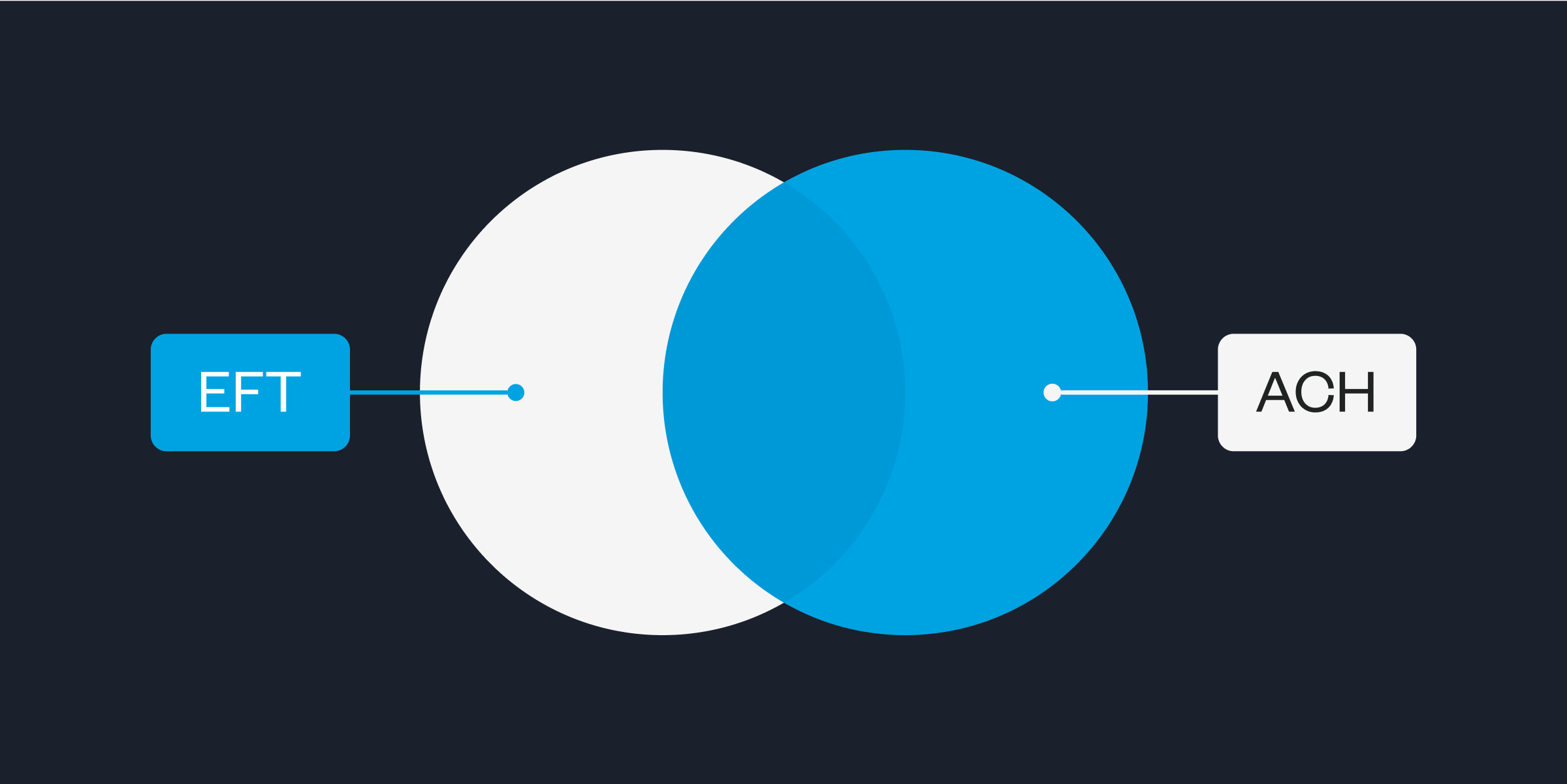
Cash Flow Optimization
ACH vs EFT Payments: Key Differences for Canadian Companies
Learn the key differences between EFT and ACH payments, how they work, which options might be available to your business
Read More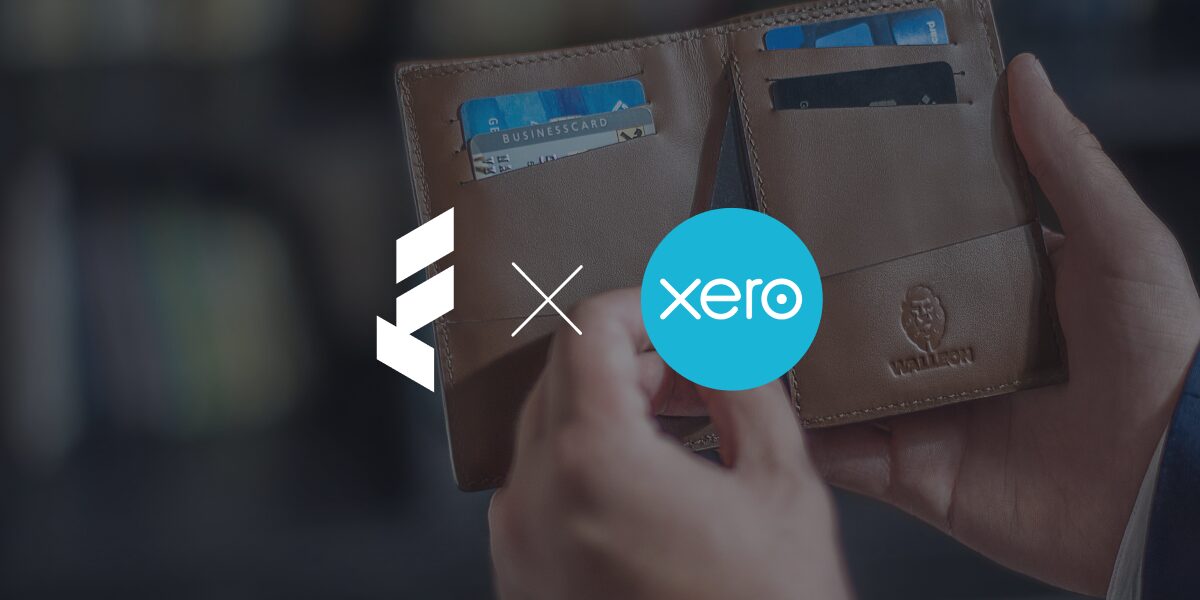
Corporate Cards
Xero Integration for Corporate Cards: Modern Accounting Software Guide
Using Xero becomes more powerful the second you integrate it with your corporate cards. Here's what you need to know.
Read More



